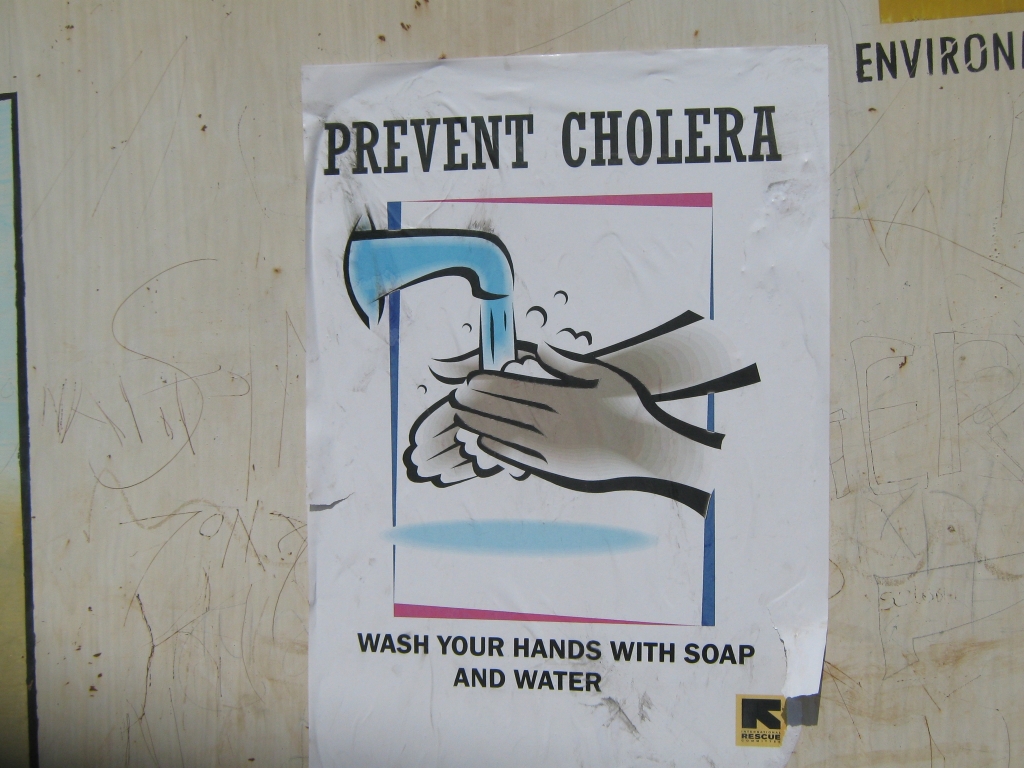Cholera broke out in Kakuma as water shortages in the camp became insurmountable. Local breweries and eateries were ordered to shut down their businesses for ten days in an attempt to curb infection. Camp Zones Four, Kakuma Four and local villages of Kalobeyei, Natiir, Nalemsokoni and Nakirkodapal are strongly affected by the epidemic.
 Three refugees and two locals have been killed by cholera, while tens have been admitted to the camp main hospital Kakuma, according to sources working with health services in Kakuma.
Three refugees and two locals have been killed by cholera, while tens have been admitted to the camp main hospital Kakuma, according to sources working with health services in Kakuma.
Cholera cases were confirmed in the camp on October 18th in Kakuma One, Zone 5, Group 58; and Kakuma Four, Phase Two, the area for newly relocated refugees. Since then there has been a rapid rise in reported cases. In the first 8 weeks of the outbreak, the Camp Main Hospital Isolation Unit counted 23 cases under intensive treatment. Refugee communities say that six refugees are dead, while Health officers from IRC confirmed only two cases. News from reliable sources estimates that there are about 100 cases of infected persons.
The first cholera case in Turkana District was confirmed on 1st September in Kalokol near Lake Turkana. The lake is about one hundred miles from the refugee camp, but there is regular movement of residents between Kalokol, surrounding villages, and the camp. Kalobeyei, Natiir, Nalemsokoni and Nakirkodapal are all strongly affected by cholera, according to residents of these villages.
Health workers concerned about unclean breweries & eateries
Health workers expressed concerns over hygiene in local spirit breweries and cited sub-standard food preparation at restaurants as a contributor to the cholera outbreak. Such eateries tend to be cheaper, making them a more accessible option for locals and refugees seeking food and alcohol.
“When we went for contact stressing and chemical spraying, the home was crowded by people sharing alcohol,” reported a community health manager. “Water shortage in the camp could lead to further rapid spread of the epidemic,” he added.
Many of the bars in Kakuma Camp and surroundings have no latrines, while flies and other insects swarm the premises. Health workers have suggested that these places be closed to prevent accelerated cholera spread of epidemic proportions.
“People won’t enjoy alcohol when they are dying”
A Sudanese group leader supports the health worker’s suggestion. “The time to act is now,” he told KANERE, offering the following rationale: “People won’t enjoy alcohol when our people are dying. After all, everybody is at risk.”
While almost everyone is talking about the threat of cholera infecting thousands, the bar owners have mixed feelings. A few of them admit that the cholera epidemic poses great risk to their lives. But camp living conditions make them desperate. “Without money we suffer; with money cholera takes lives. It is unavoidable death for us,” a local woman bar owner said.
On the ground, health institutions have intervened to stop the spread of cholera. The Kenyan Government, UNHCR and IRC launched a joint sensitization and awareness campaign. Public restaurants were closed for ten days in early November.
At a joint meeting between Government health ministries, UNHCR, implementing partner agencies, and refugee community leaders, sources say that the epidemic is known to be rapidly increasing. “The first six weeks have had few cases. However, the seventh and eight weeks have had many cases compared to the previous weeks,” said a Congolese leader based on information gained from the meeting.
In the meeting, participants were told that cholera has no specific signs or symptoms and can go “on and off” for a long time. This puts refugees in a dilemma. One manager in the IRC Community Health Office defined cholera as profuse diarrhea that comes involuntary and causes rapid dehydration of the body. At the camp main hospital, “we admit any diarrhea case with profuse stool.” he said.
This is not the first time that a cholera epidemic has hit Kakuma Camp. With the onset of the rainy season each year, cholera strikes camp residents with varying intensity.
